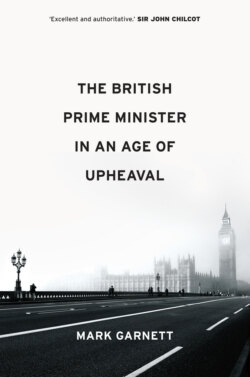The British Prime Minister in an Age of Upheaval

Реклама. ООО «ЛитРес», ИНН: 7719571260.
Оглавление
Mark Garnett. The British Prime Minister in an Age of Upheaval
CONTENTS
Guide
Pages
Dedication
The British Prime Minister in an Age of Upheaval
Preface and acknowledgements
Introduction
The Prime Minister in history and theory
Rationale and structure of the book
1 Majority leader
The Prime Minister in Parliament since 1979
The Prime Minister versus Parliament
A breakdown of party discipline?
A measure of control? Prime Minister’s Questions
Choosing a champion
Conclusion
Notes
2 Cabinet-maker
‘Near-ideal’ scenarios: Thatcher (1987) and Blair (2001)
The Thatcher reshuffle of June 1987
Blair in 2001
Suboptimal scenarios: 2010 and 2015
The May reshuffles
Conclusion
Notes
3 Policy-maker
The impact of Thatcher
The relegation of Cabinet
The obsession with the private sector
‘Hiving off’
Pragmatism versus ideology
Hollowing out the Home Office
Prime Ministers and policy-making
Margaret Thatcher
John Major
Tony Blair
Gordon Brown
David Cameron
Theresa May
Conclusion
Notes
4 Communicator in Chief
Margaret Thatcher
John Major
Tony Blair
Gordon Brown
David Cameron
Theresa May
Conclusion
Notes
5 Speaker for Britain
Hollowing out the Foreign Office
The Prime Minister and foreign policy since the Falklands
John Major
Tony Blair
Gordon Brown
David Cameron
Theresa May
Conclusion
Notes
6 Election winner
The Thatcher effect
Nightmare on Murdoch Street
Things can only get better?
The advent of leader debates
Notes
Conclusion: the Johnson premiership
The Prime Minister in theory
An honourable ambition?
‘The leadership Britain deserves’: Johnson at No. 10
Majority leader
Cabinet-maker
Policy-maker
Communicator in Chief and election winner
Pandemic and pandemonium
Notes
Bibliography
Index. A
B
C
D
E
F
G
H
I
J
K
L
M
N
O
P
R
S
T
U
V
W
Y
POLITY END USER LICENSE AGREEMENT
Отрывок из книги
‘Approachably written, wide-ranging, and both historically aware and bang up to date, Mark Garnett’s book helps explain why what has become an almost impossible job – one that offers presidentialstyle prominence but far less real power than many of us imagine – increasingly seems to attract such improbable politicians. A great read for anyone interested in the past, present and future of British politics.’
Tim Bale, Queen Mary University of London
.....
It was never likely that the return of the Conservatives in December 2019, with an overall majority of eighty seats, would put an end to the battle between Parliament and the Prime Minister. However, the lesson of the conflict since 1979 is that even though individual governments might lose the occasional skirmish, through ill luck or mind-boggling incompetence, the executive will always find some way to ensure parliamentary obedience (if not confidence in the literal sense).
For those who believe that the place of Parliament is to advise rather than to obstruct the executive, the removal of the whip from twenty-one Conservative MPs – who included eight former Cabinet ministers (of whom two had served as Chancellor of the Exchequer and one had recently attracted respectable support in his bid for the party leadership) – probably seemed like a laudable return to resolute leadership after decades in which rebels had been treated too tenderly. Perhaps the best justification for this position is that MPs owe their places in Parliament to party affiliation rather than their personal attributes – a case which gained considerable credence when all of the Brexit rebels who fought the 2019 general election without official Conservative endorsement lost their seats. Yet Edmund Burke’s definition of a political party – ‘a body of men united for promoting by the joint endeavours the national interest upon some particular principle in which they are all agreed’ – was idealistic even at the time it was pronounced, and is now hopelessly outdated, not only because of its gendered language. Political parties – even relatively small ones in parliamentary terms – include people who disagree, often on fundamental issues; some elected representatives, indeed, have at times stuck with their parties even when it has become clear that they have much more in common with their supposed rivals. The job of ensuring that these ill-assorted groups end up in the same voting lobby in the House of Commons has never been easy, which is why it has been entrusted to a team of officials – usually about fourteen strong – known as ‘whips’. Especially in the early post-war period, the ability of the whips to crush the spirit of rebellion was the stuff of legend. Allegedly they ran a system of espionage which was far more effective than the Cold War secret services, gathering damaging intelligence on their party colleagues without (unlike MI6) ever divulging their findings to ‘the other side’. If the legends were true, MPs were less privileged than other people because the price of entering Parliament was to forfeit the right to cast a truly ‘free’ vote, even on matters of conscience. The price of integrity could be political and even personal ruin.
.....